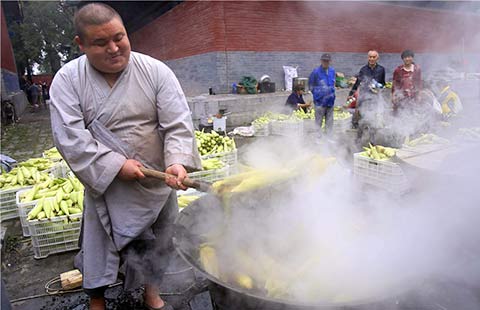
Recent research suggests that people who regularly eat spicy food may have a lower risk of premature death from cancer or coronary and respiratory diseases, but some experts are warning that excessive consumption could result in other illnesses. Shan Juan and Cheng Yingqi report.
Sit down in any restaurant in any Chinatown in a Western country and it's a fair bet that if you are not ethnically Chinese or don't speak reasonable Mandarin you will be offered the "regular menu", featuring localized versions of favorites such as sweet and sour chicken and other adapted dishes.
It's long been known that almost every Chinese restaurant in Western countries has a "secret" menu offering authentic food that only Chinese customers are thought likely to enjoy; such as noodles in a spicy broth as red as a fire truck.
The restaurant owners may have created the secret menu to prevent customers from encountering foods deemed unsuitable for the average Western palate - duck neck, chicken feet and snake and turtle soup, for example - and to protect them from burning their tongues. However, by doing so they may have also inadvertently hidden a different secret - that of a longer, healthier life.
The results of a study of the dietary habits of 500,000 Chinese people conducted by scientists from Harvard and Peking universities suggests that those who ate spicy food three times a week had a 14 percent lower risk of premature death from certain illnesses than diners who preferred blander food.
The survey was part of the China Kadoorie Biobank Study, a program that aims to identify the causes of major illnesses such as stroke, heart disease, cancer, diabetes and chronic respiratory disease.
"Spicy food is extremely popular in China. That prompted us to conduct the study," Lu Qi, an associate professor of medicine at Harvard Medical School, wrote in an e-mail exchange with China Daily.
According to Lu, there is growing evidence, albeit mostly from experimental research, to support the view that spices or their active components, such as capsaicin, can benefit human health, although there is a lack of demographic data to support the conclusions.
Capsaicin is the compound responsible for the burning sensation that accompanies eating chili, the fruit of the capsicum plant. The seeds of the capsicum are mainly dispersed by birds, and some scientists believe the fiery taste is a natural defense and is intended to discourage consumption by mammals with molar teeth, which would grind, and therefore destroy, the seeds. It's also believed that capsaicin can act as an anti-fungal agent, preventing potential deadly fungi, such as fusarium, from attacking the plants.
Differing approaches
Lu and his team conducted their research on adults from 10 geographically diverse areas of China between 2004 and 2008, while a seven-year follow-up study charted the subsequent mortality and morbidity rates.
When choosing their subjects, Lu and his co-workers excluded people with cancer and heart disease, and those who'd had a stroke. Those chosen were divided into two groups, and different approaches were used to analyze the potential relationship between their consumption of spicy food and the presumed health benefits.
In the first group, the researchers factored in age and other relevant factors, such as smoking. They discovered a "significant inverse association" between the consumption of spicy food and a lower risk of death from cancer and heart and respiratory diseases; that is, the more spicy food a person ate, the lower the risk of contracting the illnesses.
The subjects in the second group were not classified by age, but factors such as smoking, level of physical activity and alcohol consumption were taken into account. The results suggested that the relationship between regular consumption of spicy food and the lower risk of early death was stronger among teetotalers than people who drank alcohol.
"Both spicy foods and alcohol affect the levels of lipids (fats), inflammation, oxidative stress, gut bacteria and other metabolic indicators - interactions may occur in these overlapped pathways. However, we lack evidence that specifically supports this process of interaction," Lu said, adding that further research would be required to find a conclusion.
Crucially, the study also failed to identify the mechanism by which spicy foods may hold back the hands of time, leaving several question marks, including the possibility that cause and effect had been confused.
"The relationship between eating spicy food and lower health risks could be a result of certain substances in chili peppers that reduce the chances of contracting some chronic diseases, but that has yet to be confirmed by scientific research," Lu said.
Fang Yu, director of dietetics at the Peking University Cancer Hospital, said general well-being may play an important role in dietary choice. "It's possible that some people eat more spicy food because they are inherently healthier than those who do not, especially in terms of their digestive systems," he said.
Lu's findings came on the back of research conducted last year by scientists at the University of California, Berkeley, which showed that when certain pain receptors were inhibited in mice - thereby preventing them from experiencing the burning sensation that usually accompanies consumption of chili peppers - those fed a diet of chili lived an average 14 percent longer than their "control" counterparts.
Statistics from the World Bank show that in 2013 the amount spent per person on health care in the US, where spicy food has a much lower profile, was $9,146, almost 25 times higher than China in the same year. However, despite the highest per capita health expenditure in the world, the average life expectancy in the US was 79, just four years longer than in China.
Although the Peking/Harvard survey was conducted relatively recently, its findings chime with ancient practices, such as Traditional Chinese medicine, which has a long history of using plant extracts to cure ailments and boost overall health.
He Juan, a profess or of TCM at the Beijing University of Chinese Medicine, said eating chili can boost the body's Yang, the more active and positive side of the competing forces of Yin and Yang, reduce blood and body fats and help the skin to retain its natural elasticity.
"That's why there are fewer overweight people in the spice-loving provinces of Sichuan and Hunan," she said, adding that the effectiveness varies according to the individual.
Although chili peppers were introduced to China in the latter half of the Ming Dynasty (1368-1644), the fruit only really gained popularity during the early years of the Qing Dynasty (1644-1911).
"It's relatively a new food item here, but it has a lot of similarities with ginger, which many ancient TCM classics recommend as a healthy food," He said.
Cautionary words
Despite the excitement prompted by Lu's research, Chen Wanqing, director of the National Central Cancer Registry at the National Health and Family Planning Commission, sounded a note of caution. He warned that the onset and development of diseases, especially cancers, involve a number of risk factors. "It's never about a single factor, or one item of food. The findings of the study might hold true for some people, such as the participants in the survey, but the results may be different for other groups," he said.
Chen also pointed out that provinces such as Sichuan and Hunan, where spicy food is highly popular, have higher rates of esophageal and stomach cancers than places where chili peppers aren't eaten as frequently.
Moreover, it is difficult to evaluate the specific health benefits of eating chili because it is never served on its own in Chinese cuisine, and the places where chili is most popular have long occupied the middle rank in lists of longevity by province, he said.
A number of research projects have identified a correlation between spicy food and certain diseases. Research published in 1994 indicated that frequently eating spicy food may increase the risk of contracting stomach cancer, while research conducted in 2006 suggested that regular ingestion of capsaicin may accelerate the migration of breast cancer cells to other parts of the body. A 2010 study concluded that capsaicin is a co-carcinogen substance - that is, an agent that activates and strengthens-for skin cancer cells.
"It's common that one substance can reduce the risk of one type of cancer while increasing the risk of another," said Fang, of Peking University Cancer Hospital, citing the example that foods rich in calcium have been proven to be effective in preventing ovarian cancer, but may also increase the risk of contracting prostate cancer.
"People should not get carried away by the findings of this new research. The only dietary ingredients that have been extracted to produce drugs that combat cancer come from shitake mushrooms and coix seeds," she said.
Contact the writers at shanjuan@chinadaily.com.cn and chengyingqi@chinadaily.com.cn
|
Diners enjoy a mammoth spicy hot pot, 10 meters in diameter and weighing 31 metric tons, during a food festival in Chongqing in November. Jing Haiquan / Xinhua |
|
Poached fish in chili oil. Chen Feibo / for China Daily |
|
Spicy crawfish. Yu Fangping / for China Daily |
|
Spicy dry pot. Zhang Kaixin / for China Daily |
|
Steamed fish head with chopped chili sauce. Li Ga / Xinhua |
(China Daily 10/08/2015 page6)








